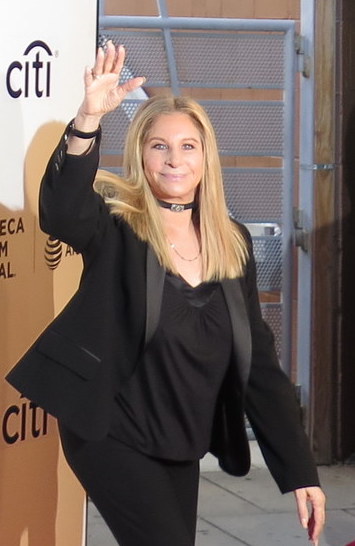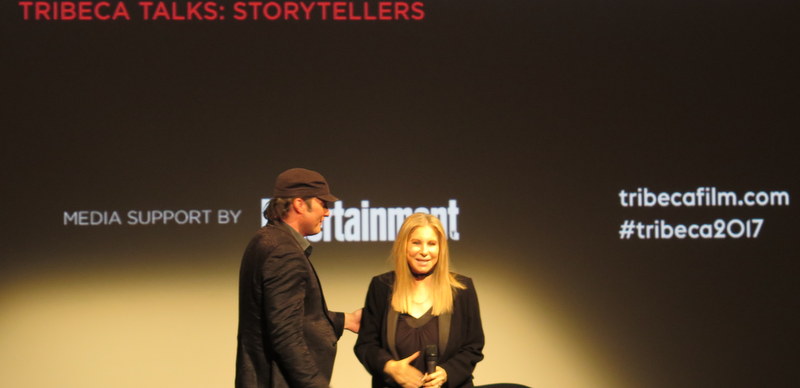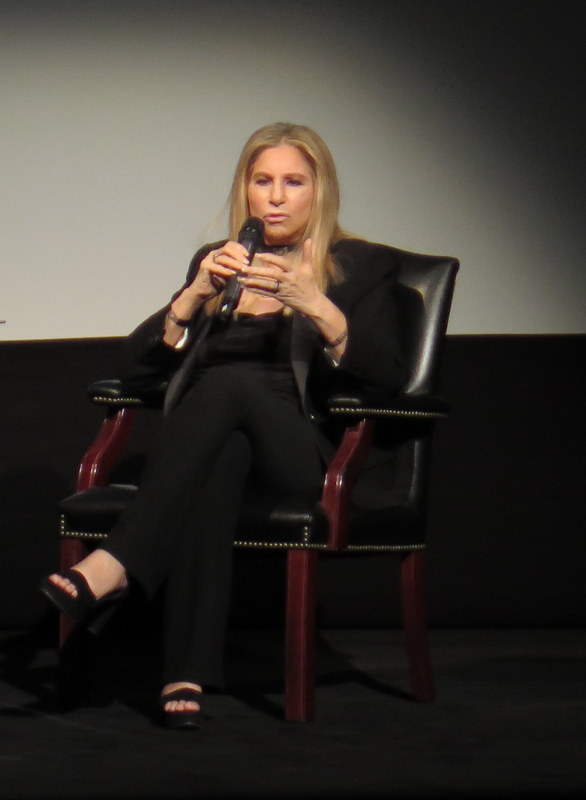by Carole Di Tosti
After Barbra Streisand’s standing ovation at BMCC for Tribeca Film Festival’s Tribeca Talks: Barbra Streisand With Robert Rodriguez, Rodriguez shared that when he first met Streisand, he was star-struck. “No one has ever come close to your level of talent, your level of achievement.” And then he added, “No one ever will.”
Barbra Streisand’s legendary status precedes her. She has sold more albums than the Rolling Stones. Rodriguez’s reference to her numerous awards (five Emmy Awards, a Special Tony Award, two Academy Awards, nine Golden Globes, ten Grammy Awards, the Presidential Medal of Freedom, a Kennedy Center Honors Prize, four Peabody Awards), indicates the depth of her achievement. It fit his introductory comment, “Barbra, we are here because we do not take you for granted.” This was followed by resounding applause which erupted many times during the evening along with laughter in response to Barbra Streisand’s unabashed humor.
Rodriguez’s authenticity paved the way for a Tribeca Talk which was nonpareil. It opened up a candor in Streisand that the audience gratefully acknowledged with a standing ovation as Rodriguez and Streisand walked offstage, arms around each other.
There were many highpoints during the evening. To Rodriguez’s question about how she “got into this,” Streisand countered with, “I think it’s because I wanted to escape reality. I wasn’t a happy kid.” Streisand dropped in at movie houses not realizing there were time schedules to each of the films. It didn’t matter; she enjoyed getting away from the drab world outside. In the darkness she moved into a world of make-believe. She would sit through two movies and if she really enjoyed a film, she sat through it again, which she sometimes did with Marlon Brando’s films who she thought was special.
Streisand explained that movies inspired her. She lived in a project in Brooklyn; she was double jointed and would do various acrobatics under the playground slides. She joked that she was the kid on the block with a good voice. Her M.O. was “no father, good voice.” (Her Dad, who was working on his Ph.D., died when she was fifteen.) She and others would harmonize on various stoops and it was at some point she thought, “I’m going to be a star.”
As a summation of how her career unfolded, Streisand says, “I believe in the power of the will. I think I kind of willed it.” Streisand didn’t brag vociferously about her desires but internally she was resolute. She knew what she wanted and her determination was profound.
She believes that one can manifest one’s own reality. She referenced an essay she read in an acting class: The Quintessence of Ibsensism by George Bernard Shaw (Around that time she wanted to be a classic actress doing Shakespeare, Ibsen, Chekhov). A concept from Shaw’s essay resonates with her: “Thoughts transcend matter.”
This concept still abides within her soul today. As an example Streisand mentioned that people often ask how she is able “to hold a note for so long.” She tells them, “Because I want to.” It is in her will.
This is the salient feature about Barbra Streisand’s being and ethos. It speaks to how she moved in her intentions from acting to singing to acting (initially, she couldn’t get a job as an actress) then from acting to directing (she wanted to control how she thought the story should be portrayed on film). Directing is a conceptualization she came to after shooting The Way We Were, On that picture she intuited two scenes in the film should be done differently to enhance the logic of the characterizations.
Streisand talents and sensibilities perhaps were always directorial. She joked about the fact that she had opinions and felt free to express them. On Funny Girl which she loved working on, William Wyler told her with humor, “Congratulations, Barbra, on directing your first picture!”
Barbra Streisand acknowledged that there are not enough women directors. She “loves when women direct and preys the film is good.” The first woman director for the brilliant Yentl (1983) Streisand pointed out it took twenty-five years for director Katherine Bigelow to be the first woman to win an Oscar for Hurt Locker.
On discussing fear as an element of success, Streisand thinks, “Fear is an engine to create, not a wall.” She added, “Don’t mention wall!” (there was laughter and applause)
Streisand says she would direct again, if she might find the right vehicle. Please, Barbra!
Photos: Carole Di Tosti
Video: Magda Katz





















